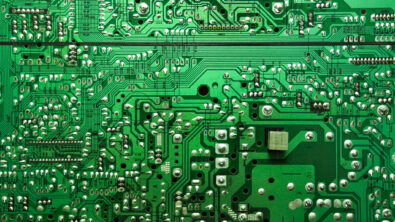Return current on a stripline
In previous blogs, I have discussed the importance of an uninterrupted, intact reference plane for signals. But, what if you have two reference planes for your signal? This is probably true of most signals in any board over 6 layers – a great deal of routing exists on the inner layers.
In a symmetrical stripline, the return current is shared equally between both planes. So, both planes need to be solid.
Often, however, a “dual stripline” structure is used to squeeze in as many routing layers as possible into a board stackup. Most dual striplines have a large gap between the two signal layers to minimize layer-to-layer crosstalk, which prompts the question: do I need to worry about the further reference plane? In order to answer that question, you need to understand that return current scales linearly with the distance to the planes. So, if I have a dual stripline structure where the signal layers are spaced 4 mils from their nearest reference plane and 12 mils apart, that means I have a 4:16 ratio of distances to reference planes for the signal layers (if I neglect the copper thickness of the signal layers), which reduces to 1:4. That means that 80% of the return current will go into the nearer reference plane and 20% will go into the further one. I discuss this (with pictures!) in the following article:
http://pcdandf.com/cms/component/content/article/246-2012-articles/9315-pcb-design
In HyperLynx DRC, you can set a threshold for the required percentage of return current in a plane to include the plane in the check, for DRCs like the Nets Crossing Gaps DRC and Reference Plane Change DRC. It’s a great way to ensure that you don’t have large amounts of current radiating into your EMI chamber!
Comments
Leave a Reply
You must be logged in to post a comment.



Thanks for information on return current in stripline.
Not sure if link provided really directs to the website you intended to, because that link navigates to
https://pcdandf.com/pcdesign/ website where I could not find any information in terms of return current images.
Can you also help me understand that, what can happen in stripline when we have only one reference plane and no second reference plane. Will the return current completely flow in available return plane.
Thanks and regards,
Surendra J.